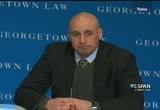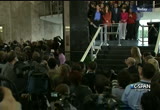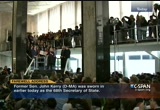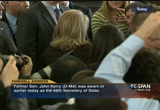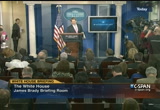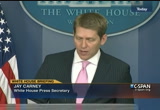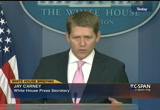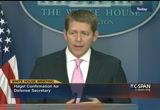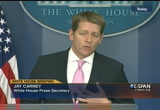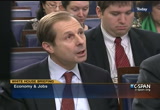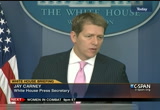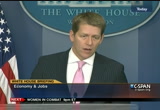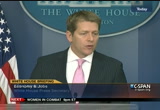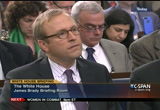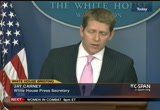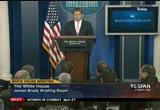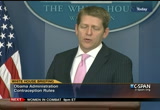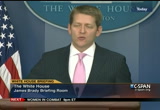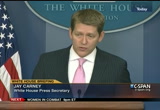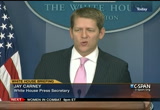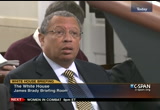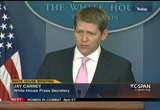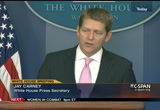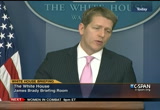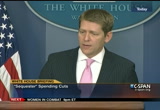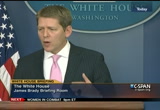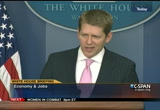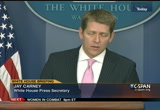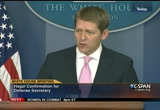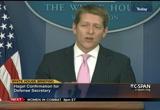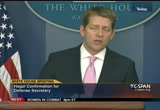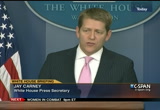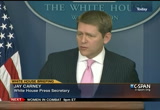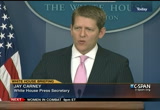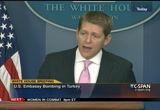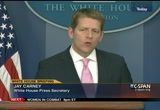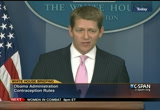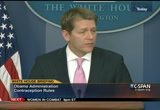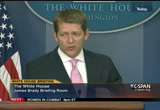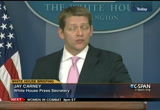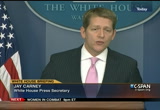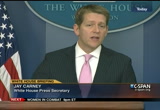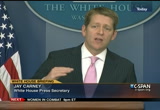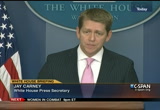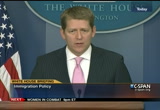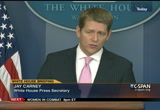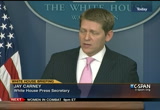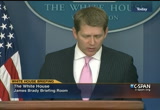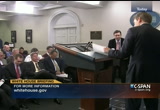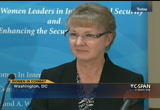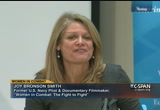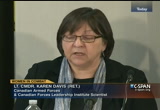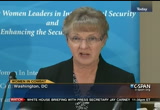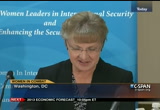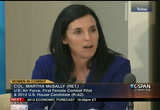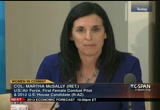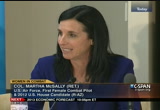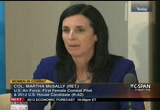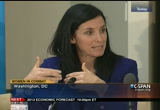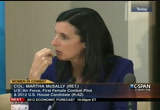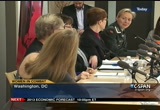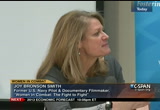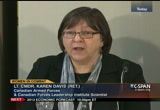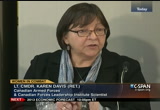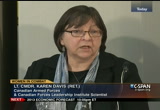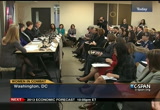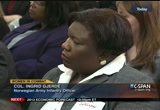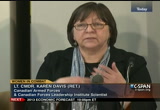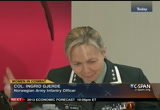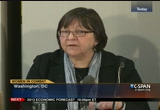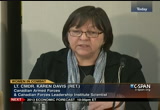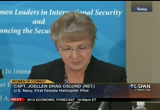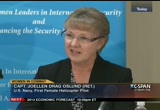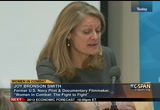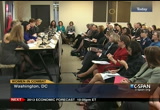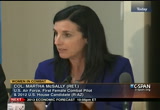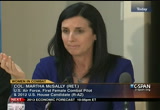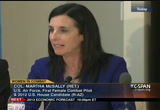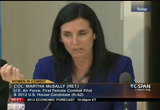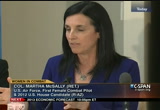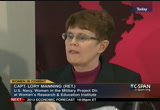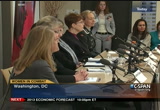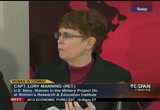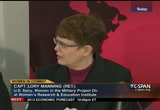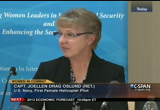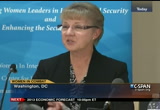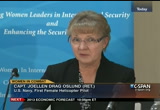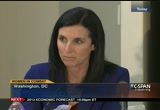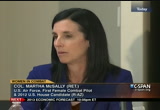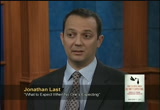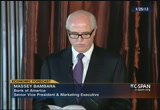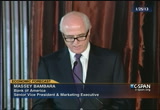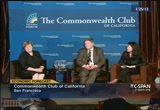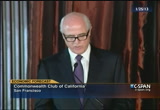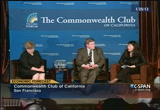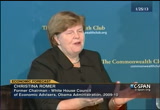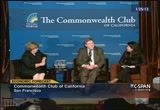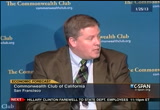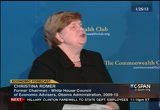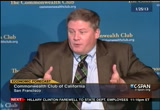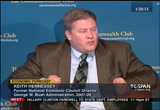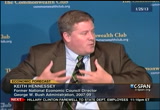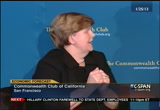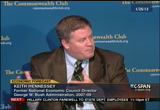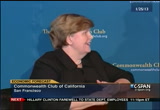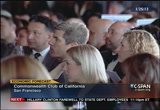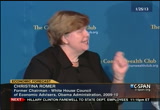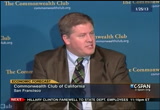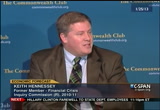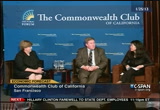tv Politics Public Policy Today CSPAN February 1, 2013 8:00pm-10:30pm EST
8:00 pm
. >> we have reached the end of our time. i ask that you join me in thanking our expert panel. [captioning performed by national captioning institute] [captions copyright national cable satellite corp. 2013] >> tonight on c-span, hillary clinton gives her farewell address at the state department. then today's white house briefing. female veterans discuss lifting of the u.s. military's ban on women in combat. and economists from the george w. bush and obama administrations give their 2013 economic forecast. today was hillary clinton's last day as secretary of state she gave a speech in which she thanked her employees and discussed american diplomacy. former senator john kerry has been sworn in as the next secretary.
8:01 pm
[cheers and applause] >> good afternoon, everyone. good afternoon, everyone. madam secretary, four years ago i stood on this same spot and had the honor of introducing you to the men and women of the department of state. on that first day on, you've touched the lives of millions and millions of people around the world. left a profoundly positive mark on american foreign policy and you've done enormous good for
8:02 pm
all of us and for the country we serve. we will miss you deeply. [cheers and applause] but none of us will ever forget your extraordinary leadership and each of us will always be deeply proud to say that we served hillary clinton's state department. [cheers and applause] and so now it's my great honor to introduce one last time the 67th secretary of state of the united states of america, hillary clinton. [cheers and applause]
8:03 pm
>> thank you. thank you. oh, well. just standing here looking out at all of you, the people i have been honored to serve and lead and work with over the last four years is an incredible experience. when i came into this building as the secretary of state four years ago and received such a warm welcome, i knew there was something really special about this place. and that having the honor to lead the state department and you said would be unique -- usaid would be unique and singular, exciting and challenging. it has been all of those things and so much more.
8:04 pm
i cannot fully express how grateful i am to those with whom i have spent many hours here, in washington, around the world and in airplanes. but i'm proud of the work we have done. to elevate diplomacy and development, to serve the nation we all love, to understand the challenges, threats and the opportunities that the united states faces. and to work with all the heart and all of our might to make sure that america is secure, that our interests are promoted and our values respected. as i look back over the past four years, i am very proud of
8:05 pm
the work we have done together. of course we live in very complex and even dangerous times as we saw again just today as our embassy in turkey. where we were attacked and lost one of our foreign service nationals and others injured. but i spoke with the ambassador and the team there, i spoke with my turkish counterparts and i told them how much we valued their commitment and their sacrifice. i know that the world we are trying to help bring into being in the 21st century will have many difficult days.
8:06 pm
but i am more optimistic today than as when i stood here a few years ago. because i have seen day after day the many contributions that our diplomats and development experts are making to help ensure that this century provides the kind of peace, progress and prosperity that not just the united states, but the entire world, especially young people, so richly deserve. i am very proud to have been secretary of state. i will miss you. i will probably be dialing up just to talk. [laughter] i will wonder what you all are doing because i know that
8:07 pm
because of your ar dense, day after day, we are making a real difference. but i leave this department confident, confident about the direction we have set, confident that the process of the q.e.r. has enabled us to ask hard questions about what we do, how we do it and whether we can do it even better. because state and a.i.d. have to always be learning organizations. we owe it to ourselves, we owe it to the president, we owe it to the american people. and so i will be an advocate from outside for the work that you continue to do here and at a.i.d. so, it's been quite a challenge this week saying good-bye to so
8:08 pm
many people and knowing that i will not have the opportunity to continue being part of this amazing team. but i am so grateful that we've had a chance to contribute in each of our ways to making our country and our world stronger, safer, fairer and better. those of you who are staying, as many of you will, please know that i hope you will redouble your efforts to do all that you can to demonstrate unequivocally why diplomacy and development are right up there with defense. we think about who we are as americans, it's because we are
8:09 pm
united and committed across our government to do what ever is required -- whatever is required to fulfill the missions we have assumed as public officials and public servants. so next week i would expect that all of you will be as focused and dedicated for secretary kerry as you have been for me and that you will continue to serve president obama and our nation with the same level of professionalism and commitment that i have seen firsthand. on a personal basis, let me wish all of you the very best, whether you've been here a week or 30 or even 40 years. [laughter] let me give you the very best
8:10 pm
wishes that i can because i'm proud to have been a part of you. i leave thinking of the nearly 70,000 people that was honored to serve and lead as part of a huge extended family. and i hope that you will continue to make yourselves, make me and make our country proud. thank you all and god bless you. [cheers and applause]
8:15 pm
[captioning performed by national captioning institute] [captions copyright national cable satellite corp. 2013] >> do not put such limited power in the hands of husband. remember all men would be tie rabbits if they could. if particular care and attention is not paid to the ladies, we are determined to foment a rebellion. >> one of the women who served as first lady. in c-span's new original series "first ladies influence and
8:16 pm
image." produced with the white house historical association, season one begins president's day, february 18, at 7:00 p.m. eastern and pacific on c-span, c-span radio and c-span.org. >> white house press secretary jay carney talked about the bombing of the u.s. embassy in turkey, calling it, quote, an act of terror. he also answered questions about the secretary nominee chuck hagel, unemployment figures and steven chu. this is 45 minutes. >> you better tell us a joke. >> no way. that was too good. i can't tell you that one. right?
8:17 pm
good afternoon, ladies and gentlemen. happy friday. i have no questions -- i mean, i have no announcements so i'll straight g straight to questions. i do -- you probably have in your inbox a statement from the president on steven chu's departure. as you know, the president, if you've read it, thanks secretary chu for his dedicated service on behalf of the american people. as a nobel prize-winning physicist or scientist, steve brought to the energy department a unique understanding of both the urgent challenge presented by climate change and the tremendous opportunity that clean energy represents for our country. this again is the president speaking. during his time as secretary, steve helped my administration move america toward real energy independence. over the past four years we have doubled the use of renewable energy, dramatically reduced our dependence on foreign oil and put our country on a path to win the global race for clean energy jobs. you can readed the full statement at your leisure. without that i'll go to
8:18 pm
questions. >> thanks. does the president consider the attack on our embassy in turkey to be a terrorist attack and does have he information about who may have perpetrated it? >> that's an excellent question. the act -- a suicide bombing on the perimeter of an embassy is by definition an act of terror. it is a terrorist attack. however, we do not know at this point who is responsible or the motivations behind the attack. the attack itself is clearly an act of terror. >> on another topic, the birth control opted out. is this a recognition that the initial rules put forward were an overreach? >> no, not at all. for details about the rule making process, which -- on which there is news today from hhs, i refer you to h.h.s. i would remind you, however, of the policy that the president outlined last year. and in outlining it he said two important criteria. one, we have to assure that
8:19 pm
women have access to preventive service like contraception and that the policy also respects religious beliefs. those guidelines, those criteria, have been followed by the department in promulgating this rule, this proposed rule. and as part that have process there is more comment that will be taken on it. but for details i'd refer to you h.h.s. >> senator hagel came under harsh criticism from republicans. his performance was panned as being lethargic and defensive. does the white house have concerned that his chances for nomination -- confirmation may be slipping in are you willing to wager to ensure that his nomination goes through? can you say how he prepared for that hearing? >> i'll say a couple of things. first of all, we expect the senate to confirm senator hagel to the position of secretary of defense. by my estimates and reading of press reports, there has been a
8:20 pm
net increase in the number of confirmed yes votes for senator hagel's confirmation since the hearing ended. in terms of the hearing itself, what struck me was the stridencey of some of the questioning from republican critics, his former colleagues. the focus on a war that this president ended, over which we can all agree there is disagreement. the president fully supports senator hagel's views on this. they were the president's views, they were the views the president expressed when he ran for office in 2008 and won. they were the views that he expressed in a campaign against senator mccain who has -- who spent most of his time asking about senator hagel's views on iraq. the president promised to end that war and he did. at the time, in 2008, as i recall, senator mccain suggested we might have troops in iraq for 100 years.
8:21 pm
that's certainly not a position that president obama or then senator obama subscribed to. it's obviously not a position that senator hagel believes was the right one. and the fact that there's a disagreement over that, i think we can all pause it. what i can tell you is that the president believes that senator hagel will make an excellent secretary of defense and that he will be confirmed. and he looks forward to working with senator hagel in that position as we continue to advance our national security priorities. >> a topic that came up yesterday, today's jobs data showed the unemployment rate rising to 7.9%. it's hovered in that range for a number of months. to be sure the economy created jobs but it's at a relatively modest pace. we had a report recently of a contraction in the nation's output in the fourth quarter of last year. increasingly you have people like laura tyson writing
8:22 pm
columns calling for the need for a plan for faster growth, not deficit reduction. what is the president -- i know you've talked about how all the president's plans envision job creation, but what does the president tell his advisors when he sees these signs of a sluggish recovery? what is he asking in the way of things to speed recovery, create jobs and stimulate growth? >> i'll go to the narrow question first. every time the president meets with his economic advisors to discuss policy proposals and refinements to existing policies, the focus is on job creation and economic growth. and that includes when we have discussions about deficit reduction. as i've said many times and as the president has made clear, deficit reduction is not a goal unto itself. it is a means to, if done right , the desired goal, which is greater growth and greater job creation. as part of an overall economic
8:23 pm
policy. i would note that today's jobs figures and the revisions that we saw in previous months' jobs figures mean that over 35 months we have created 6.1 million private sector jobs. we created in 2012, and i revised from my remarks the other day, when i said two million, we created 2.2 million now with the revisions, jobs in 2012. that means that we have been moving in the right direction when it comes to job creation. what is also true is that when this president took office in january of 2009, we were in the midst of the worst recession since the great depression. we were in economic freefall. we were losing, we were hemorrhaging jobs at something like 3/4 of a million jobs each month and the hole dug by that recession in jobs terms was more than 8 1/2 million. we still have work to do and we need to make sure, to your
8:24 pm
first point, and the first part of your question, that when we device economic policies and we negotiate with congress on how to move forward, that we cannot neglect the essential responsibility to ensure that the policies we put in place promote job creation, promote economic growth. and that is why in every proposal the president has put forward, every budget, every submission to the supercommittee, every document he has placed before speaker boehner and their negotiations, he has included within his overall deficit reduction plans specific measures to invest in our economy, to ensure that it continues to grow, to ensure that it creates jobs. specific members that address some of the weaknesses in our economy. the need to grow -- the need to grow jobs within the infrastructure, within the construction business. if the congress had passed the american jobs act, those components that they refused to pass, you know, thousands, tens
8:25 pm
of thousands of people would be more people would be at work in the construction industry. and that's an industry that has been rebounding of late, very importantly. if republicans hadn't refused to go along with it, the substantial job loss we've seen in state and local employment, especially among teachers, would have been addressed through the american jobs act. these are ideas the president continues to insist be part of any proposal moving forward when it comes to overall economic policy. >> i just have a question. john kerry is quoted in the "boston globe" saying that the president offered him the job of secretary of state a full week before susan rice pulled out. is that timeline accurate? >> i don't have conversations to read out to you. what i can tell you is that, two thirnings one, the president -- two things, one, president the is very confident that now secretary kerry will be an excellent member of his cabinet and will serve
8:26 pm
auspiciously in that position. he also believes that ambassador rice has done and will continue to do an excellent job on the president's national security team, as our representative to the united nationses and she could do any job in that field very abley. and that's what he said at the time. ambassador rice made the decision to withdraw from that process. at the time, and we discussed it often, before you were in this chair, but i know you covered it from elsewhere, you know, the really absurd obsession for political purposes by critics on capitol hill, on the talking points provided for appearances on a sunday show with regards to the attack in benghazi, you know, that remains i think an unfortunate episode. one that will not reflect well on the senate in the long run or on those who continue to press it. the president is very glad that
8:27 pm
ambassador rice is continuing to serve in his cabinet and on his team as our ambassador to the united nations. >> the reason why i ask is he apparently -- senator kerry or secretary, soon to be secretary kerry -- >> moments away, i guess. >> is reading this out. he said, the president called him a week before. he said, this is kerry quoted, he called me and said, you're my choice. i want you to do. this he asked me to keep it quiet. i did. i sat on it. >> i'm not going -- >> the reason i ask is because you from that podium told us just two days before rice pulled out that the decision had not been made. so i'm just trying to -- who's right here? you or -- >> i would simply say that i'm not going to read out specific conversations. i speak for the president and the president, when he makes a decision, announces it. and that was the case. >> are you concerned that kerry's kind of reading out private conversation with the? the >> no. the president is enormously
8:28 pm
gratified that senator kerry was confirmed by such a substantial margin. by his former colleagues, and looks forward to what he expects to be excellent service as the head of the state department. >> there's a report, an exact replica of the oval office is being built in the eisenhower building for -- is that accurate? >> i would refer to you g.s.a. for construction and renovation information. again, i would refer you to the g.s.a. i have no moving plans to announce. >> what is the balance that the administration is trying to strike with the proposed rules? on contraception? >> i think it's reflected in the criteria i just repeated for you. the criteria that he made clear were important to him, as these rules were put in place, which is that we needed to provide
8:29 pm
preventive services, access to preventive services for all women, and that includes contraception, and we also needed to respect religious beliefs and that is the balance the president made clear he wanted to be kept in mind as these rules were proposed and developed. for details on them, i honestly just don't have details on them. i would refer to you h.h.s. i believe they're briefing on them this afternoon. >> a couple of days ago you described what you think are changes in republican positions on the sequester as make itedly political. so i just want to -- >> i stand by that. >> ok. i thought you might. in november of 2011, the president said, i will veto any effort to get rid of those automatic spending cuts to domestic and defense spending, there will be no easy off ramps on this one. >> that's a quote taken wholly out of context. that's in reference to attempts to eliminate part of the sequester and not the other. which would suggest that when
8:30 pm
the republicans and democrats work together to forge the budget control act and to reach that compromise, that some members were crossing their fingers when they signed on the dotted line. the fact is the is he quest wars designed, defense cuts, nondefense cuts, half in half, both of them onerous, both of them bad policy, specifically to compel congress to avoid the implementation of the sequester by doing the responsible thing and coming up with $1.2 trillion in additional deficit reduction in a balanced and appropriate just remove part of the sequestered. the part we do not like. that was never part of the agreement. it was disingenuous to suggest that was inappropriate course to take. the entire sequester is bad policy. , it was designed to be bad policy, on defense and non- defense across-the-board cuts. the negative consequences of implementation would be bad across the board. that is the point. congress needs to do its job.
8:31 pm
the president has put forward compromise proposals that would eliminate the sequester, achieved the 1.2 trillion dollars in deficit reduction in a balanced way. he looks forward to working with congress to do that. that is how it was designed. that is how that is understood. >> so the veto is a set issue. who you want to sequester removed or realigned? >> we do not believe the sequester should be -- on mike republicans who are now saying it is a good political card to have in your back pocket, that it would not be so bad if it were implemented, which contradicts scores of things they said last year, when it was potentially going to come to pass, the president continues to believe the sequester is bad policy, and we should avoid it by implementing further responsible deficit reduction in a balanced way. the point is, i am not -- not
8:32 pm
sure what you are asking. does the president opposed implementation of the sequestered? absolutely. that is consistent with his position all along. have some of the republicans contradicted themselves and said the sequester would be fine? >> yes. >> you do not in any way wish to correct -- >> i am not going to get into private conversations between the president and a senator or cabinet member. i can tell you the president made an announcement. he had made a decision. he made an announcement. >> was the hhs announcement today prompted by the challenge for contraception? how would you expect it to resolve those differences? >> i would have to refer you to hhs. i can tell you there is a process in place.
8:33 pm
there is a preliminary process, a stage in the process of rule making. it is entirely consistent with the way these things work. the rules themselves, the proposed rules, are in keeping with the criteria the president laid out last year. >> on the jobs numbers, there are indications from the conference that more people are delaying their retirement. and that is having an impact on youth employment. >> i have not seen those reports. i would refer you, and detailed analysis of the jobs report, to alan krueger's who writings on this, the chairman of the council of economic advisers. what i can tell you is, he is from 2012, with the revisions, but the average monthly job creation -- the average of each month at the time was $142,000 per month -- and was one,
8:34 pm
thousand 40 -- 142,000 per month. we had 2.2 million jobs created in 2012. these are private sector jobs. an additional 166 private-sector jobs -- 166,000 private-sector jobs added by businesses in january. a 35-month trend, he possible job growth in the private sector. the president believes the need to continue to work toward recovery from the terrible recession, and toward further economic growth and job creation beyond that. need to pass laws that enhance the recovery, enhance job creation, the enhancement of security. the position in this country for the kind of economic performance in the 21st century that the united states enjoyed in the
8:35 pm
20th. >> i want to try one more on hhs. it said the new opt out would not expand beyond what was intended in the 2012 final. how can the administration guarantee that? >> i do not have details on these rules. the briefing on them -- i am not in a position to answer questions about the specifics of the rulemaking process. i think we are traveling monday at this point, they have all the information. >> discussions going on between the white house and congressional leaders. are we getting closer to the deadline? >> i would simply say that our position, which i think is shared by many in congress, is that we need to approach this in
8:36 pm
a balanced way. there are ways to do this that would eliminate the sequester, would do it in a balanced way, would allow us to continue to invest in our economy and help it grow and create jobs. we will work with congress to help bring all of the about. the president does believe that progress needs to be made. if it is not, it may be viewed by some on capitol hill a sound political strategy to flirt with or allow sequester to take place. the president believes that is bad policy. we sought a 40-year record drop in defense spending in the fourth quarter that had to do in part with anticipation of the implementation of the sequestered. that obviously have negative consequences for gdp. we ought to get about the
8:37 pm
business of reaching an agreement on bounced deficit reduction that makes the sequester what it was always meant to be in, which was eliminated by better policy. >> the president has been in touch with congressional leaders. >> i do not have conversations to leave out. we are engaged with congress. we fully intend to make our views and our position is clear in the coming days. >> the president has been talking about immigration, gun policy. is he concerned that we will lose momentum on those issues as we get to be sequestered? >> these are all important issues. the priority this president has is what he has always henhouse, which is restoring economic growth and job creation in this country to a place where we are
8:38 pm
positioned in the 21st century for the kind of economic performance we enjoyed in the 20th. that means recovering from the worst recession since the great depression. it means investing in the right areas of our economy to help it grow, to help it create and develop industries that provide well paying jobs to americans here, that allow us to address energy issues for the 21st century in ways that produce economic benefits for this country, that allow us to ensure that our kids are getting properly educated for the 21st century economy. that means making investments in education. it means trying to address the situation where even as we have for 35 straight months in private sector job creation, we
8:39 pm
have for much of that time seen job loss in state and local governments. that is a portion of it. in education, schoolteachers, the president has put forward proposals. this is his highest priority. it is important to look at things like immigration reform. businesses have vocally and publicly, as an economic necessity -- the economic benefits of comprehensive immigration reform are manyfold and very important. that is the principal reason the president believes we need to come forward in a bipartisan way and get this done. there is every reason, both economic and otherwise, he to continue to make the progress that has been made, that we have seen. and get it done. get a bill passed that represents the consensus that is building who, he that reflects
8:40 pm
the principles that are shared by the bipartisan group in the senate, and make it law, make it a fact. >> are there any changes in the way the white house wants to ensure that hagle -- hagel is confirmed, asking members to come forward, perhaps? >> all i can say is what i said initially. by my read of news reports, he number of senators who have said positively that they will vote to confirm the senator as secretary of defense, has increased since the hearing yesterday. and we anticipate and hope the senate will act quickly to confirm him and put him in place in the pentagon. >> in terms of the way he answered various questions, i know you took issue with the
8:41 pm
tough question style of republican senators. is the white house pleased with how senator hagel answered questions? >> i believe he did a fine job. if you look, if you take all the news clips, not the whole performance, but the news clips that have dominated television report and on this, they have focused on a series of exchanges that i think, by any estimation, largely represent the injuring over issues like, why did you disagree with me over iraq? we are prepared to say that senator obama had a view on iraq. it was one of the reasons he ran on that position and one in 2008 against senator mccain. he vowed to end the war in iraq in a with a protected our national security interests. now, he is focused on winding
8:42 pm
down the war in afghanistan. someone bizarrely, and given that we have 56,000 americans in uniform in afghanistan, senators yesterday, in a hearing for the nomination of the secretary of defense asked very few questions about that active war. instead, they wanted to read- litigate the past. -- relitigate the past. that argument will be assessed by participants and historians. we felt comfortable about where president obama has spent and is on that, and where senator hagel has been and is on that. what he is focused on, the president and the senator, is on the challenges we have today around the world, national security challenges. they include afghanistan, a subject that got short shrift yesterday among senators who were concerned about relitigating the past.
8:43 pm
we believe he will be confirmed. i think there has been an increase in the number of senators who have come out in support of him, not a decrease since the hearing. while the process is important, and it is a vital function of our democracy, the confirmation process, i would be stunned if in the end of republican senators decided to try to block the nomination of a decorated war veteran who was once among their colleagues in the senate, as a republican. i think it depends on what -- i think i addressed that yesterday. i think senator hagel address some of the questions about his answers on iran. ultimately, as i said yesterday, if we judge the regime in tehran by its behavior, but it's a flagrant violation of international obligations, that behavior is
8:44 pm
certainly a legitimate. ultimately, it is for the iranian people to decide the legitimacy of their government. we deal with the government we have to do with. with our international partners, we have been relentless in pursuit of a policy that insists that iran give up its nuclear weapons ambitions and get right with its international obligations. their refusal to do that thus far has resulted in the greatest isolation that it has ever experienced, and the most punitive sanctions regime in history. again, you want to play a gotcha game -- if you want to ask me about a specific question our answer, i can certainly answer that. the senator answered questions for hours yesterday, seven hours, eight hours. i think he conducted himself
8:45 pm
appropriately and well. the president looks forward to his confirmation as secretary of defense. >> a turkish high-level official said that the bomber was connected to a domestic group. the prime minister also ahead and said there was a need for international cooperation against terrorism first, what would your message to turkey on its terrorism problem? that administration might be willing to take target? >> this is an incident that just occurred. i do not want to get ahead of it. it is being investigated. we strongly condemn a suicide attack against our embassy in
8:46 pm
ankara. it was stopped by our first security perimeter. details are still emerging about what exactly happened, who was responsible. it was clearly an act of terror. it cost the life of a least one individual, a turkish security guard, as you know. we will work closely and are working closely to investigate the incident and bring the perpetrators to justice. our thoughts and prayers go out to the families of those who killed and injured. we appreciate the support from our turkish friends in responding to this tragedy. we have worked shoulder to shoulder with the turks to counter terrorist threats. this will only strengthen our resolve. with turkey has been an important ballet -- allied, broadly speaking, in the effort to counter terrorism.
8:47 pm
>> you have any sketches of the main message here? >> i do not have to the joint announcements to make or remarks to preview. >> is ed koch coming? and what is the plan for the super bowl? >> the president will watch it with interest. [laughter] i do not know who will join him in watching the game, although his peers are not in it. interesting white -- although his bears are not in it. interesting dynamic, brother versus brother. we expected to be entertaining. a man to ask him yesterday. i do not know who he favors in this matchup. how absent his beloved chicago bears, he probably just as an
8:48 pm
interest in a close and good football game. i just do not have any announcements to make about who is going to be there. >> the initial accommodation that was announced on the hhs mandate appeared to be a deal to appease progressive catholics that the administration had inadvertently upset during a very politically charged time of an election year. the accommodation we are saying today, february 10 last year, the president saying we would not spend a year doing this -- >> there was a process required to take place. there was an and vans notice of, require bromide in. that is the kind of phrase you could only find in washington, but that is how it works. that is followed by a nervous of proposed rulemaking, which is
8:49 pm
with us today. in between there, there is work on the rule, which happened. in part because of input who brought in as part of the process. for details about how this bill which clarifies what we had last year, i just do not have the details for you. the president has been very clear about his views on this. he believes there are compelling interests, which are the necessary -- necessity of and appropriateness of providing preventive services to women across the country, including contraception, and making sure we are mindful of religious liberty. he has instructed those who work for him on this issue to be cognizant of this criteria as they develop the rules. >> if it was such a priority for him, why couldn't this have
8:50 pm
happened why year ago? >> you are talking about a rule making process. agencies develop rules, based on laws all the time. he answered questions about his views on it. there are very clear, those views. those views and formed the rulemaking process. in terms of how that has unfolded, the pace and direction is entirely in the norm. i refer you to hhs for more details. >> if employees and insurers are paying for the contraceptive coverage, isn't it costs being borne by other injured folks are taxpayers? >> you are asking me the details that hhs can answer for you. i will do a little research over the weekend, if you want me to answer those questions, although the could be answered today, and
8:51 pm
down the street. the details about the rule making process are available as we speak at the department of health and human services. >> this is very controversial. i do not understand why the white house, "if you have a cell phone, you could go and call hhs now and get the details. i do not have them for you. is this, "the daily show"? >> when is the president going to sign the debt limit bill? >> i will get back to you. >> the house says it will vote for the president to submit a balanced budget. what you think about that? >> the president has put forward repeatedly budget proposals that address our fiscal challenges, that bring our very important deficit and debt to gdp ratios too high a level that puts us on a sustainable fiscal path, for a
8:52 pm
significant time. his proposals reflect the need for balance, the need to ensure that even as we bring our deficit down, but we do not ask seniors or families with children who have disabilities, or families who are struggling to send their kids to college, to bear the burden, so we can allow hedge fund managers to keep a loophole in the tax code that results in them paying a vastly lower tax rate than most of us in this room, and most every average american out there. that is a balanced approach that is broadly supported by the american people, and irresponsible way to reduce our deficit. it was endorsed by several bipartisan commissions who have addressed with their own proposals the fiscal challenges we face. the president absolutely intends to put forward, as he continues
8:53 pm
negotiations with congress -- this was the prior to the primary subject of debate in last year's election. the american people were pretty clear about which approached the preferred. steve? >> 43 republican senators signed a letter to the president today, saying they would block any nominee for the consumer financial protection bureau, unless you change the law, the same stance they had in the last congress. i wonder if you have any reaction. >> it is unfortunate that a minority of the u.s. senate continues to oppose the implementation of wall street reform designed to protect the american taxpayer from the kind of crisis we sought engendered by the collapse of our financial sector in 2007 and 2008. it was designed to protect the establishment -- it was established to make sure that the average american's who have
8:54 pm
dealings with financial institutions have somebody in washington looking out for their interest, because financial institutions, as you know, have plenty of people in washington looking out for theirs. it is unfortunate that republicans have continued their efforts to oppose this bureau, oppose the implementation of a key component of the wall street reform law. it is tough to explain to the american people, whose memories are not short, about what this country when through, and what taxpayers have to do to prevent the total collapse of the financial sector, as we dealt with institutions that are too big to fail. who both the bush and administration and the obama administration had to make decisions that were unpopular, but necessary to save a total collapse. have fortunately, the taxpayer money invested by this address attrition has been paid back.
8:55 pm
but wall street reform was designed to make sure that never again would an institution that had to be unwound have to be funded by the american taxpayer. this is an important element of reform. the president urges the senate to confirm richard cordray to the head of that bureau. as the letter you cited demonstrates, he has substantially more than a majority of support within the u.s. senate. that should surely be enough for confirmation. >> the president is going to be given -- giving his state of the union address, and many are looking to the leadership to implement the president's agenda. he has had a number in the economic departments -- does the president hope to be able to
8:56 pm
appoint federal workers toward the leadership they are going to have by the state of the union address? can he connect that? >> it is a good question, but i do not have a timetable to provide to you for further personnel announcements. when it comes to cabinet service, the president's cabinet in the first term had remarkably low turnover historically. it is true after four years that there have been a lot of departures, and therefore spots to fill. the president is doing that in a very deliberate way, and will continue to make announcements as he is ready to make them. he will continue to do that expeditiously. and he will hope that than the senate and richard cordray will move quickly to consider the nominations and confirm them who, as a corporate. >> i wondered if you had any reactions to the human rights
8:57 pm
reform announcement that was critical of the u.s. on immigration policy. the u.s. has the most people in jail in the world. also, he "abusive practices" in guantanamo. senator menendez is leading the effort for a minister -- for reform. is the white house concerned about allegations that he is involved in a scandal? >> i have nothing to say about that. i would refer you to the senate. i am not aware of the report. i think the president, when it comes forward, -- comes to immigration, has put forward comprehensive reform he believes is essential to the health of our economy and protection of our middle class. he looks forward to working with the senate and the house to get
8:58 pm
that confirmed. he has made the fact that is a clarity of his very clear. i am not familiar with the report, so i cannot really respond. >> a military group, made a statement saying that senator hagel must use his authority to ban discrimination and guarantee equal opportunity for lesbian, gay, and transsexual members of the military. that seemed a foregone who during the confirmation process. the white house expect him to make this policy happen. >> i would point you to numerous answers the senator gave about hamas support for issues regarding lgbt rights, including service in our military. the president's positions on this are clear. he continues to intend to make progress on this, as he made clear at his inaugural.
8:59 pm
>> on the benefits issue, when will these benefits be inactive? >> i think expeditiously is when they would get the attention, as senator hagel rightly answered, hopefully with him at the pentagon as soon as possible. >> the departures of cabinet members? >> i think cabinet members have made the decisions i have made. and that -- they have made, and had conversations with the president about what their plans are. how do you square the questions? one says we are way behind in filling these positions. the other says we need to get them all done quickly. the president is obviously having, has had, and will continue to have conversations with the leading members of his team, including cabinet secretaries. >> are all the departures of
9:00 pm
voluntary? >> i know of none that are not voluntary. i would simply say that the president, as you have seen in the statements he has made series of policies that will help public country out of the worst economy we have known in most of our lifetimes. that's pointed us in a far better direction. he looks forward to working with those that remain and working with those who will join the team after being confirmed by the senate area thanks. >> on monday the president will travel to the minneapolis police department police department in minnesota where he will deliver remarks and discuss with local leaders and law enforcement officials has comprehensive that of con -- commonsense sense ideas to reduce gun violence.
9:01 pm
the neapolis has taken important steps to reduce gun violence and foster a conversation in the community about what further action is needed. the president will visit with members of the community about there if ranks as and discuss additional steps that can be taken at the federal level. he will return to washington d.c. in the evening. he will be at the white house attending meetings. on wednesday, he will attend the democratic caucus retreat. i do not have a preview of the remarks. thursday, he will deliver remarks at the national prayer breakfast here, many travel to leesburg, virginia to do liver remarks. on friday, the president will attend meetings at the white house rea. have a good weekend. have a good super bowl. go team.
9:02 pm
>> on the next "washington journal," patrick rice on the latest unemployment figures. and the head of the national coalition on adoption institute of talk about international adoption. it begins live in o'clock a.m. eastern time. -- 7:00 a.m. eastern time. >> the movie itself, it is not a stretch to argue that gone with the wind is the most popular american historical film ever made. by one estimate, something like 90% of the americans have seen the movie at least once. it has been noted that it became a worldwide phenomenon as well. the book was banned by the not phase, while the french resistance saw it as a symbolic
9:03 pm
representation of strength amid occupation. it was recommended by leaders as part of the vietnam conflict. in japan, the movie was turned into a successful all-female musical. the movie is probably the most -- single most influential interpretation of the civil war in 21st century popular culture. >> gone with the wind goes up a trail of southern culture. that is saturday night at eight o'clock eastern on c-span three. >> now, women who have served in the u.s. military discuss the milk -- difficulties they face. they are joined by female veterans of the canadian and norwegian military. this event hosted by the stockholm institute and the service women's action network. >> all i can say is wow. it is really an honor to be here and hear the testimonies of
9:04 pm
those amazing women who are decorated combat veterans, but are ridiculously articulate answers here what their experiences were. i am honored to be here with this panel. all of these women are accomplished and through their lives and work, they have laid the groundwork for lifting previous restrictions on women post a military service. they have been hard -- part of lifting past restrictions. and gender integration in the military. their full biographies are in the program. i will give a brief introduction. captain joellen osland was one of the first women excepted to navy flight school. she was the navy's first female helicopter pilot. between 1975 and 1978 she was a plaintiff in a lawsuit that
9:05 pm
successfully challenges you restrictions on women flying and serving about -- aboard noncombat ships. she has remained politically active throughout her life. next to her is colonel martha makes sally. - mcsally. as an a-10 thunderbolt pilot, she was the first american woman to fly into combat. she completed multiple deployments associated with operations. she was the first woman in u.s. history to command a combat aviation unit during active combat areas in recognition of her leadership, she received a bronze star and air medals. she continues to have illustrious military ends now post military career. ask to her is karen, a retired
9:06 pm
lieutenant from the canadian forces. -- i'm sorry, a lieutenant commander. the canadian structure is difficult for me. following her service in the canadian forces, she has become a defense on their behalf. she has written several books about women in the canadian forces. she has completed her phd dissertation, "negotiating gender in the canadian forces. " her is captain lory manning, she has served on many high- level staff. she is the director of the women in the military project at the women's research and education institute. she served for six years on the secretary of veterans affairs
9:07 pm
advisory committee on women veterans. she was a member of the military advisory committee at the servicemembers legal defense network for three years. next america colonel ingrid gjerde, and active-duty infantry officer with operational experience in the norwegian army. she began active-duty in 19 87 and has ground combat experience to share with us. she served as a platoon commander in southern lebanon, a rifle company commander in bosnia and between national contingent commander in afghanistan, responsible for all norwegian troops. i enjoyed bronson smith, i was a former navy pilot during the gulf war era. i am now a documentary filmmaker. i am working about a film about the fight to fight. the evolution of the u.s. military in regard to women in combat. i think we should start our discussion talking -- we will
9:08 pm
do this more as a discussion. i will direct questions to the panelists around areas -- various topics rated and think we should talk about the political climate. women in the military in different countries. we just had this announcement by the secretary of defense of joint chiefs of staff, rescinding the combat restriction policy. it came specifically from the military. it came at the request of the military. things have gone differently in different countries. what prompted canada to remove the restriction on women in armed services? >> through the 1980's, the military was dealing with the requirements of our human rights act and the canadian charter of rights and freedoms which became part of the canadian constitution in 1985. at that point, and was
9:09 pm
considered discriminatory to treat women differently in terms of employment and a range of other things. throughout the 1980's, several women and one man submitted complaints to our human rights commission. none of the complaints related to combat, but to restrictions on the employment of women. either because there was a minimum mail components, the women were denied entry, because there were enough women, or because they were only allowed to serve in certain units. one of them was an administration clerk, but she was denied deployment in a particular unit because it was considered too close to combat. one man submitted a complaint, he was a fighter pilot. he complains that men for -- bore a disproportionate responsibility for risk in combat. the tribunal looked at these cases, they opened up a complete review of the canadian military and how it treated gender. they looked closely at the issue of operational effectiveness,
9:10 pm
the military sent several witnesses to the tribe you know -- tribunal. they ordered the canadian forces to completely integrate women into all roles in the following 10 years. the tribunal carries the weight of law in canada. they were legally obligated to move forward in that direction. >> how does it occur in norway? >> honestly, i do not know too many details before we opened in 1984. we have a society where equal rights for men and women is very deep founded. i am quite sure that was a political issue. at this time, there was such a small percentage of women in the armed forces in the other branches, which were open and the 1970's.
9:11 pm
that is norwegian society where every man and woman should be greeted -- treated equal. have the same opportunities. it is has -- it is never questioned. >> what about in the u.s.? captain manning, do you think that here we look at the military as just another opportunity for employment? do we look at it as somehow distinctly different from business or other types of employment opportunities? >> we are all over the place on it. to the prevailing view is that it is different. in the u.s., what women have been allowed to do in the military, if you go back to 1901 when we started, it depends on what the military needs, what
9:12 pm
women are already doing, and mixed into that is a great big dollop of what society thinks emotionally is fitting for women to do. those things have changed over time. every time something new opens for women, even if it was probably just moving from the desk to standing up in a file cabinet during world war i, it involves this whole political discussion. the biggest mess i have seen where things really erupted, was in the mid-1970's. people thought era was going to pass. the equal rights amendment, for those of you who are not worn then. the lawsuits out there by both men and women, saying -- and members of congress, saying it is time to open the service academies to women. that is the only change that i
9:13 pm
know of that has been made with respect to women in the military, but the service is thought to his and nail. -- fought tooth and nail. they thought women in the academies would defile it somehow. if you look at the congressional testimony, one of the, i think he was the cadet commander, he said this is our school. if you bring them in, you are directing it. -- wrecking it. i heard the same arguments come in just last week on television. they are still out there. they are still very vocal. if you look back through the history, there is a whole political go around every time we open something. severance happened pretty quietly. but for the rest of it, -- submarines happened pretty quietly.
9:14 pm
but for the rest of it, you are told the doom is upon us. a year later, it was like, what was the big deal? i suspect the same thing will happen here. it's what happened, 10 years from now, they will wonder why anybody opposed it. >> you are both first wave women, let's take it chronologically. you were the first wave when women were first allowed into flight school. what was your experience integrating and the reception you received? >> the way the flight program was open to women was a little bit similar to what secretary panetta has just done. they kind of sad, make it so. there it was. in our case, it was the then
9:15 pm
chief of naval operations. he was probably one of the most forward thinkers that the navy has had. in 1972-73, he was taking into account a number of factors. one of them was era, as she mentioned. the other was the end of the draft. it was ended in 1970. the navy had about a 10% retention rate following the vietnam war. the big push was, where are we going to find people? the obvious choice, as far as the admiral was concerned, was to start recruiting more women and get women in the services. his service was the navy. the way he sought to make that more attractive to women was to start opening up some specialties that had been closed to them. you have to think about what was going on in the 1970's. in a historic context.
9:16 pm
women were still being discharged for pregnancy, up until 1975. we did not even have uniforms that were correct for the jobs that were being opened up. when i started standing watch in my squadron, i had to walk the flight line in shields and a skirt. it was two miles long and you did it several times during your watch. one day i showed up in enlisted who -- boots and pants to try and walk the flight line, and i got blasted for it pretty good. i was allowed to wear pants with captain of the watch. the flight suits, the clothing was -- is dad not fit real well. there -- it did not fit real well. it was an amazing experience.
9:17 pm
i have to say, on the whole, the helicopter community was very welcoming. it would not -- it was higher up the chain of command. i was on the west coast at the time. as you got more senior officers involved, there was more resistant. part of that was, i think, because of the way that the program was instituted. they did not give a lot of thought to an actual career path for the women. they thought it would be cute to have us around for a few years, then we would find a guy and get married and go away. then they can sit around and think about what was going on. it came as a shock for them to find out that the first few of us had plans to stay around. we had plans about how it was going to be handled. >> kernel, you had a slightly less welcoming experience? >> let me just say, among my
9:18 pm
other hobbies, his sparring with the bull on the fox news channel. yesterday was the most intriguing. you can go check the tapes. i would say that, in general, but this is a leadership issue. this is about leadership, making sure we have the most capable fighting force. this is about good order and discipline. that is the bottom line. when they open up air force fighters to women, what it felt like on our end, i am not sure what happened -- on our end, they were like, good luck. i look at what some of what they have gone through the overturning of don't ask don't tell to make sure the leadership climate continued to be for the mission in good order
9:19 pm
and discipline. not complaining about it, but it appears that none of that actually happens when we trans ocean to fighters. they thought, let them go. if we draw attention to it, it will create more problems area did not true. i knew it was going to be a rough environment. you guys have all seen top gun. that bastion of -- i don't know. it was challenging. i had three older brothers. i knew how to hold my own. i was ready for it. what i was not ready for was being ignored. i back was turned on me by my squadron commander when i went to introduce myself. i found out later, i squadron commander had a meeting with all
9:20 pm
the pilots and said, let me tell you what he should've said -- hey, we are about to get another pilot in the squadron who went through the same training as you, who is qualified and keep the ball and going to go to war with us. met all the standards. we have a mission to do, i expect everyone will be professional. we are in this together. we have a long history, heritage, for what we have done in combat. we are going to uphold that. if anyone asked and professionally, i will cut your head off. instead, he had a meeting and said, the worst possible thing is about to happen. [laughter]i wasn't there. i am assuming my colleagues are telling me the truth. we are about to get a woman. that was the climate that was set on a first walked in -- when i first walked in. within a month, he traded out and i had a new commander come in who had the mindset that i first conveyed.
9:21 pm
luckily for me, we deployed fairly quickly. within a month of me being in my squadron, saddam hussein was threatening to come south again. they wanted to bring in a squad quickly to try and determine that. so we deployed. there is nothing like a deployment to get rid of all the nonsense of people feeling threatened in their careers or whatever that is. i will say, in general my experience -- when you get into your unit and prove yourself and show that you are capable, it is the same thing that the last panel is talking about. you are either going to hit the target or not. you are either capable or not. it is a single seat fighter. nobody else will fly the airplane if you cannot do the mission. if you prove yourself by your scores. by your performance. very quickly, my teammates in bank unit would accept me as one of the team. in general, the challenge for me and other women was, i was
9:22 pm
continuing to have hostility from people i had not met. people outside the unit. able, i do not know who they are. they had interesting things to say about me and my capabilities. i think other women experience that as well. becoming a teammate, you are well respected, but you have some of that. especially for me, when i started to upgrade. it is one thing to be a wing man, where you are told what to do. then, you become a flight lead, that is another interesting dynamic. then you become an instructor pilot. then your trading other pilots. then i got promoted two years ahead of my peers. that was when some of the worst dynamic happens, when i started to succeed. all the emotions came in -- you are only promoted because you are a woman and the things that come with that.
9:23 pm
i would imagine in those units that still remain exclusionary, even though they may have.'s women with them, there will be similar dynamics going on. it is a leadership issue is. from the top down. they need to make sure they set the standards. they need to set the right climate. they need to hold the line on that. that should go just fine. the other thing i will point out, i know you have a lot of other questions -- i know it will happen again. i have seen it in the discussions in the last week. people will make an assumption that the standards will be lowered for you, then they are pissed off about it. it is all in their heads. it is just ridiculous. you would not believe the number of altercations and the officers club club i had over this issue. they just assume that, you do
9:24 pm
not have what it takes, and i am told that you will stay anyway, and that is me off. did you get a memo down the chain of command that says you need to lower the standards? no, but i know it is going to happen. it happened in the past. when did it happen in the past question mark do not try to be rational. seeing it again, a conversation i had yesterday with an elected official. there is an assumption that the standards will be lowered that makes people angry and they take it out on you as if you do not belong there. you need to go into counseling. mental health is available. this is not real. there is no policy coming down doing that. we need to battle that in it is out there. >> i want to comment on this, because i very much agree. i think it is a fear about the masculine image of these
9:25 pm
ranches. we see that in norway after 20 years with female and disposition. many of our male colleagues have this image built up from hollywood movies. they are often very far away from the truth. that is what they fear. >> i have a specific question for you. >> i ran the navy's pt policy for a wild. the entire time i followed stuff on women in the military. occupationally, i have only seen one lowered. it was the navy's test of flexibility. it is part of the regular pt testing. you sit on the floor with your legs straight ahead, you have to
9:26 pm
be able to touch your toes. extra points for getting beyond. we had to change that because too many men could not get extra points for going beyond. the thing that gets under their skin more than anything is the sex differential in pt. i have never heard one of them complain about the age differential. >> i wanted to ask you as we talk about previous integrations, one of the things you are hearing now is the saying, if you open the combat arms to women, you will have fewer women interested in joining the army or the marine corps, because they fear those assignments and you don't want them. people said that before they opened combat ships in the navy. what is the truth behind that? x after your hearing what i heard in the first panel, i do not think there is a lack of interest.
9:27 pm
before 1994, when combat ships were open to women, navy women might to go to to see one time if they were lucky. my entire experience was when i was out on an island, running intelligence. i just have to go out and them sometime in the carrier. i had to be off there before sundown. there was great fear in the navy that once we opened the combat ships to women, they would find they would go to sea as often as the men. that women would be bailing out , women who did not sign up for that would quit. it didn't happen. there may have been somebody that got out and, certainly, women and men in the navy and all the services have a family
9:28 pm
hole. particularly once they are married or have children. it did not happen in the navy. women are a much higher percentage of the navy than they were active in 1994. they kept running, and in bigger numbers. >> along the way, a lot more women got out because of the opportunities were denied them, rather than offered to them. >> in the canadian forces, how did integration occur? how quickly did it occur, what lessons to be learned from the way it was implement it? >> in 1997, we could see it coming. the complaints before the tribunal. in 1987, they started a trial that was designed to determine if, when, and how restrictions to the deployment of women might be changed. in hindsight, people look back and say this was a natural part of the progression. put women into the combat arms.
9:29 pm
look back at what happens, it was very much set up to test the impact of women on combat operational units. an important point is, when we talk about quotas, critical mass, and we talk about goals, the crew trials demanded that a certain proportion of women be in each unit, so they could evaluate their impact. what that did was grow the quota system. it created a series of perceptions around the motivations of women, the abilities of women, and that is in. the tribunal ruled that you would no longer have crew trials, just got on with it. the trials will no wonder be -- no longer be used to evaluate, they will be used to integrate women. the canadian forces said, right
9:30 pm
we will change all of our policies. it was an administrative process and our headquarters. i 1994, they said, great to have integrated women and they have equal opportunity and liability for all women in the canadian forces areas except the part of crew that was supposed to be monitoring and helping the effective integration. it was not happening. by 19 97, we had wasted a decade by possibly thinking that women could just get in there. the onus became on women. the women that were successful, they were leaders from the very beginning. they had to integrate themselves into the unit. by 1997, we conducted research and looked more closely at at the barriers and why leadership at all levels had to be engaged. it cannot just be the top saying it would happen. it had to be effective through
9:31 pm
every level of the chain. some of the things that the colonel referred to about preparing the unit. if men in the combat arms unit were not effectively working at the women coming in, they left it to the team to sort it out, rather than leadership shaping the team. it took us a decade to get on board and actually get some effective progress living. much different today. >> thank you. the norwegian forces were already fully integrated when you joined, everything was open to women. i know everyone wants to hear about your if. -- experience as an officer. what was your role -- talk about what it was like coming up as an infantry officer in a fully integrated military? we still have some issues,
9:32 pm
all over. i am so excited for my american sisters in arms. this is such great news this week. but, i also have to tell you, you have some hard work in front of you. after 28 years, we still have some issues we are struggling with. it will still take time until we can say we are truly fully integrated. my personal experience, i feel privileged to be able to have the jobs i have had. ii have been very lucky to have the right commanders with the right approach to having women in their unit area i think, like she just said, leadership is vital. military leadership at every
9:33 pm
level, but also the political leadership areas they need to encourage females to come in to the forces. we are hard on those leaders who are not able to handle having women in their unit. i questioned those men who are not able to handle, or can't accept women, how are they able to handle the missions we have? handling local populations where we deploy, and so on. this is important. personally, i have done this same job, the same training as my male colleagues. i recognize what the panel here said. it is all about being part of the team. one of my soldiers, when i was a complete commander going to bosnia, was interviewed in the media.
9:34 pm
i remember, how was it to have a female company commander? i said, -- he said, i have not really thought about it erie it i never had a male company commander. [laughter]that is all about being one of the team. doing your job areas my experience is that my male colleagues, as we are out doing our missions in norway or deployed, they are so dedicated about the job they are there to do. they are not caring about if there is a female next to them. the question is, are you doing your job or not? i felt support, i have really felt appreciated for the job i
9:35 pm
have done throughout these years. both as a subordinate, but also as a commander. we do have issues. as a commander, i have struggled with female troops that had a hard time with sexual harassment. we have to work continuously to make sure that every individual in our troops, male and female, are handled like you should do. >> who have hit on some of the same things that the first panel hit on. being part of the team, doing your job, knowing the prison next to you is going to be there to take a bullet for you. tell us about your personal ground combat experience and what the characteristics are that you think are important to being -- holding that in doing that job in the right way,
9:36 pm
regardless of gender. >> i am humbled when i listen to the former panel. i have been in violent situations. we have wounded and losses. but i have a lot of the high intensity combat experience. about the characters, which i find important. very much what was mentioned from the former panel. it is about being calm in very tough situations. make the right judgments. is not only for me as the commander, that is the same for the troops. when you have a rifle pointed at you, you have to take this very quick decision to answer, to support the one next to you and all of this very hard questions.
9:37 pm
that is an important one. team, i absolutely agree about your team. when you are fighting, you are not thinking about the flag and your country and a very important things. you are thinking about the comrade next to you. we are the team, we have a job to do and we had at her do it well together. >> something to add? >> i was going to add, as you just mentioned the issue of harassment. in canada, what became very important was paying attention to other policy changes and implementation happening at the same time. our soldiers in the early 1990s's, we had implemented sexual harassment policies. a strong message had gone out from senior leadership that there was zero tolerance. leadership in the combat unit
9:38 pm
feeling ill equipped to properly discipline and train and motivate their team, they were afraid of being accused of harassment. paying attention to other policy issues in things that are happening at the same time is important for us to read >> i would like to add one more thing. what i find vital. having the right values. that is the same for men and women. that is what else the right culture in a unit. that is what you had to focus on continuously as a leader, or as the troop. that is also the vital thing to handle what we do in this -- not only the combat branches, but every branch. handling everything from high intensity to dealing with
9:39 pm
assistance -- assistants. you have to be able to do your job in such a variety of tasks. >> talked about the nonphysical requirements for excellence. but let's talk a little bit about the standards. a lot of questions will circulate around the establishment of standards. i am curious, the canadian forces, initially took a gender norms approach question mark >> the standards have to be gender- neutral. but they have to be job related. not physical standards that have nothing to do with performing the job. today when they are deploying, it does not matter if you are and it is strange and clerk
9:40 pm
cormedix rooted if you are deploying as part of the regiment, everybody does the combat fitness test together in preparation. everybody has to continue to meet the standards of their specific occupation. they are arbitrary standards. a certain number of jokes -- push-ups. you have been working with the australians? that's -- >> yes. a number of us went to australia. we shared some lessons we have learned. the two big ones that a lot of people experience question his critical mass, and the idea of training to do a job and not training to meet the physical standard rooted of course there is some overlap. >> physical standards, this was
9:41 pm
a huge issue when women were first taken into flight program. next year will be the 40th anniversary of the day i got my wings. it was very disheartening to hear, 39 years later that the issue was still upper body strength and bathrooms. i said to my husband, i am stunned that we haven't moved past this. it is still a huge emotional component with the physical standards. one of the ways that i handled it, on the subject of the backroom issue, -- bathroom, how you do this in a helicopter? the men have a relief to. -- tube. occasionally, since there were only two our legs, but on
9:42 pm
occasion it did become an issue for me. one of the first things that happened to me when i got into the squadron, the men were all talking about this. they presented me with a little gift on my third flight. it was an oxygen mask with a large two and a sponge attached. this was my version of the relief to the. -- tube. i thought it was kind of a good idea. [laughter] it is such an emotional issue. you cannot avoid the fact that, for guys it is all about the upper body strength, we are stronger than you. the truth of the matter is, that is not what it takes. gender-neutral physical requirements are the way to go. very related to the job. i cannot say that -- i had a lot
9:43 pm
of upper body strength from riding horses and shoveling what comes out the other end. that served me well in the military. it really was not an issue, except in the minds of the people who open refi program to women. when general dunphy and the secretary of defense have their press conference, general dunphy was asked about women in special forces. he talked about standards. he went on to talk about critical mask. -- mass. he said, i think we all believe there will be women who can meet this standard. the other part of the equation
9:44 pm
is, in order to account for their safety and success in those units, we have to have enough of them so that you know they have mentors and leaders above them. do not take one woman who could not meet the standard, the issue there would not be privacy, it would eat, where is her ability to kimmy -- compete for command? i know we all have an opinion, it would be nice, but most of us have gone through as one of one. what to think about about this idea? what is the idea of one of one? pre-k's -- >> i am not sure where that came from. maybe that was under advisement. and that makes me know cents. you do not need women mentors
9:45 pm
for women. all of my mentors were men. any time you have that language where you need women with each other, that is just the wrong climate to the setting from a leadership climate. i was the only woman in my fighter squadron for a long time. you try to figure out how to put us in pairs. usually we are our own worst enemies. you are actually better off as just one of you when you get going. the reality that we needed women to be with each other in that critical mass was not how we've integrated women into trying. -- flying. they tried when i was an instructor to divide students. i was the one who put the kibosh .. that creates
9:46 pm
resentment in men. it is not smart all around. to the one on one comment makes no sense. you are evaluated based on your group and peers, not your gender. that evaluation language that somehow a woman would we looked at by herself for the motion -- for promotion, unless there was to in the unit. if that is really how they are forming had to do this, that is the wrong direction. we need to make sure we are continuing to recruit the most capable force. we need to get out into high schools to get the best men and women for jobs. except those right standards. if you end up being the only woman in your unit, that is fine. it is a leadership issue. whether it comes down to bathrooms and showers, we have . l worked this out throug
9:47 pm
just make sure they have the right command chain to make sure that people are treated and mentor it and can meet her promotion like everybody else. 30 seconds in the physical standard -- it continues to be this red herring. when debating whether to open fighters were women. it was the same. they don't have the upper body strength. i was getting ready to go to fighter training. i have just completed a triathlon. we have guys standing up saying that women do not have the endurance. i sat there, do not say nothing. finally, you can just cannot
9:48 pm
help yourself. like, do you want to go outside and talk about this? the difficulty, i am seeing this in the debate still going on, even though the train has left the station. a lot of people gives this can get away with, you have been excluded from doing this. so you have not done it. and i have done it. therefore you can't do it. i don't know if you the nuances on tv. sure you've been in combat, you've engaged with the enemy, you've responded to firepower. that is different then sustained offensive operations. that is the language you are hearing right now. on fox anyway. right now, the strength it takes to engage in sustained operations. something that a woman can do. justin bieber can do it but venus williams cannot? [laughter]
9:49 pm
i encourage you all -- this is not about individuals, it is about standards and capabilities. yes, men, upper body strength, we have to treat people as individuals. of all the challenges we have had in the combat zone with conduct and behavior of our soldiers. it has never been about physical strength. it is usually about discipline and restraint. strategic errors. we had no problem lowering the standards in 2005 in high school education and medical conditions and aptitude test and felony records. we had no problems lowering the standards to meet the force. our soldiers need strength and endurance. they also need leadership, teamwork, courage, restraint,
9:50 pm
wisdom. all the things we saw on that last panel. that is what makes up a strategic corporal these days. strength is one issue. get over it. >> i agree with most of what she said. but i think it is very important when we are discussing females, we are talking about very physical demanding jobs. you have to have a certain physical standard. it is very tough to be and one of these units if you do not meet the requirements. you had to leave -- in norway, well, we are so technologically advanced, we do not need the physical standard. that is not the truth. patrolling in afghanistan, it is
9:51 pm
still very hard. >> i totally agree. >> the other parts, i was concerned about the critical mass. i think you will have a very hard time implementing females in these branches if you are obsessed by certain numbers. i am concerned when i hear about pacific shares of women. -- specific shares of women. i have been the only one for many years and it has been fine. i have a better time in unit with more women. it does something to the culture. i think you need a certain amount to influence the culture. we should not say we need pacific shares, but we should work hard to increase the
9:52 pm
number if we want to do something about the culture. if you really believe that as women, we bring something unique to the table. that is my approach to it. i could also mention one thing from norway -- we have this discussion with -- about our female troops about how integrated they are in the units. some of them are complaining. they say, you put as in specific groups or specific eric's. -- barracks. then we are not part of the team 24/seven, like some of the male colleagues reviewed. when deployed, it is not an issue. we live in the same tense, close to each other. in the barracks, one of our
9:53 pm
border units to russia, we have the female soldiers sleeping in the same rooms as their male colleagues all year around. i did not want this and we separated. the reason for this is that when we are deployed, there is a rule, no alcohol. so we do not have all these issues. the combination with alcohol, young men and women together, that it's not always easy. when they came home from -- the few harassment issues we had, they were always combined with alcohol. i was a little concerned to have
9:54 pm
them sleeping in the syndrome. -- the same room. >> the critical mass thing put me on red alert and i have been listening to that. particularly since i saw the article yesterday talking about what the general thinks it means. i do not think they know what they mean by critical mass. having been on staff duty a lot and seeing the compromises that have had to be made to come to a -- accord, to get all four of the service chiefs in line with the policy, that would put in there as a way of walking the dog back. those of us who watch implementation i got to watch
9:55 pm
very carefully, because of all the dangers that have been mentioned. it is in their -- i do not think we should send a 19-year- old to a remote duty where she is the only woman in 26 miles. on the other hand, it should not be a barrier to occupation. army people going through the leader court. if there was a critical mass necessary. those of us sitting here would all be back in the 1950's. that is the thing that has to be watched. >> we have time for one or two .uestions are >> you started to hit on not
9:56 pm
sending the single 19-year-old female out. i'll admit, at 19 i did not know anything about the military or life in general. would you like to see navy officers and senior members moved into these positions first? >> i do not think there is a one-size-fits-all for this . you cannot come up with one plan and say that is the way it is going to be. when i was in the navy, i was the only officer sent with a group of 20 women right out of boot camp with no other training to a communications facility. i spent a lot of my time telling the chiefs, this is the haircut regulation, this is what uniforms should look like. a lot of that has already been done. i do not think you can come up
9:57 pm
with a one-size-fits-all. you do have to look at where the unit is. i would not send 119-year-old woman -- one 19-year-old woman alone for there were no women of any kind, anywhere. if i was not allowed to be the only woman, then i would not have been the xo of the squad. first women ceo of a navy ship, she was the only woman on the ship. it has to be done individually. it has to be carefully, with thought. this got about one of one, that doesn't make any sense. >it has to be done with common
9:58 pm
sense. it is situational. >> think you also much. this is very informative. this is mostly for the named captains. i wanted to know what you thought of the navy's decision to integrate women into submarines. >> similar to the decision to put women in flight training, a little bit different. submarines require a bit more of a pipeline. there is a flight training program for aviators. it is a little more extensive or submarines. there is the quarters issue and the long times of deployment and underwater and everything. i think it was a long time coming. they threw up a lot of artificial barriers that have finally come down. i expect the women will do fine in submarines.
9:59 pm
it is an interesting environment. >> change does open the fast attack summer rains to women. that is where all the -- submarines to women. that is where all the fun is. that is where people want to go. that is where you do the tactics. where you are engaged in the intel operations. if you want to be a submarine admiral, you have to spend time there. >> [indiscernible]>> all but stuff can be worked out with common sense. >> mine has to do with implementation.
10:00 pm
in the low sought -- a lawsuit ruled in her favor, it took 15 years before navy ships were open to women, and 15 years it took another 20 years until the navy finally groomed a captain to be a commander. what are your thoughts, quickly, on how to speed up the implementation that you have to grow these young women at the private level up to be e-9's? >> i think that -- one of the reasons it took so long as you're well aware -- that is my husband by the way [laughter] but one of the reasons it took
10:01 pm
so long because of frankly foot dragging. if there was an opportunity to delay a decision to say we need more study that is how i see this critical mass thing. it is a great excuse to delay plemmings -- implementation. after the lawsuit, which was handed down in 1978, i would say the 1980's was a peed of two steps forward, one step back, it was -- if they could make a decision that on struggetted the implementation of the law then that is what they did. starting with the fact that as soon as it was struck down in the 9th circuit court they had a new version passed in 1979. that instituted the 180-day
10:02 pm
thing. that is what we struggled with until 191. then there was the jag interpretation of things. it said women couldn't be assigned to duty aboard ship. that meant that i was not allowed to hover over a ship if it is anchored on a bay. that kind of obstruction we have to watch out for. that is one of the things we have to be watched carefully. >> i think we have to caution -- we shouldn't be fast forwarding women to higher positions because you are setting them up to fail. it takes time. it took time when we changed the policy in 1993 for me to be a commander in 1994. that was pretty fast because i was older and had more experience under my bell.
10:03 pm
there are things we can -- you've seen the last panel. we had 280,000 women deployed to afghanistan and iraq. there are women that are in combat that can make lateral moves into positions that were closed from serving in right away. they can get the training in other words to fill the square for the qualification they need. we shouldn't have to start from scratch. in our case we had to start from scratch. in many cases, they should be creative enough to say we have females and enlisted officers that already have the experience. let's move them over and give them the opportunity to move forward so we don't have to wait 20 years into leadership positions based on the experience they already have. >> we're going to have to cut the discussion off here. i do want thank all of you for
10:04 pm
sharing your wisdom and experience. the discussion has clearly begun. >> next on c-span economists from the george w. bush and president obama campaign give their economic forecast. >> you are able to see the fertility rates declining. by the time we hit the second word war we around about 2.2 then after the first -- second word war wed that only major increase in our fertility rate in the country's history. that was the baby boom. that is -- nerve -- everyone
10:05 pm
knows about the baby boom. not only did it jump up but it stayed up for an entire generation. people really changed the way they lived for a generation. by 1970 that moment had ended. we saw not a gradual float down but the fertility rate jumping off a cliff. >> how birthrates can have the u.s. lose its place as a world leader. look for more book tv online. like us on facebook. >> my cartoons depict native humor. at first when i first started this cartoon they were native characters and native situations.
10:06 pm
my audience was geared towards natives. but in the last four or five years, they have become more universal where they spilled out into the mainstream. they are more universal now. i'm inspired by the people that are -- that i grew up with, my friends, my family, members of my tribe. just watching people and some of the things they do. if you pay attention to what people do and say, there is a lot of humor you can find in that and make your own twists in certain things. people who have read my cartoons for the first time, i hope they take with them an aappreciation the native culture and the way of life. because it is not always
10:07 pm
depicted correctly in cinema or books. this is coming from a genuine native american and these are my views. even though they may not agree with some of the cartoons or my views i hope they can appreciate it. it comes from a real person who grew up on the reservation and has seen the dominant culture and lived with the document innocent culture. so some of the -- dominant culture. >> one of the authors you will meet this weekend on book tv. saturday at noon eastern on c-span's 2 book tv. and on c-span 3 on the american history. >> at the bank of america's economic forecast economist from
10:08 pm
the george w. bush and obama administration discuss the future of the u.s. economic as well as health care, education, and the federal budget. this is just over an hour. >> good afternoon and welcome to today's meeting of the commonwealth club of california. i'm president of bank of america, member of the commonwealth club. we welcome our listeners and welcome everyone to visit us on our website. we're pleased to present the economic forecast named in honor of the late past president and board member. he also served as chief economist and vice president of the bank of america. today's program is sponsored by the memorial fund and bank of
10:09 pm
america. today's program will feature two distinguished speakers with their viewpoints. mr. keith hennessy who teaches at the graduate school of business and stanford law school . keith served as director of the economic council as assistance to president bush. as director during the 2008 financial crisis mr. hennessy was at the center of one of the most volatile times in american history. he was a senior white house economic advisor where he designed the president's policy on health care, energy and institutions among others. he has spent more than 1 -- 15
10:10 pm
years working with political cat officials. since leaving the white house he has been a television com tater. he also served a member of the financial crisis information. as chair of president obama's council of economic advisors from 2009 until september 2010 she was one of the four economic principles who met with president obama daily to design and guide the administration's response to the great recession. she played a key role in the administration's economic policy, reform of the financial
10:11 pm
system, health care reform and budget policy. an expert in american history she is a leading scholar on the great deapprehension the monetary and fiscal policy. she is co-director of the program at the national bureau of economic research. she is a regular contributer to "the new york times" and contributors to the bloomberg television. today, they will be in conversation with anna, who is the vice chair of the board of governors. please welcome our guests. [applause]
10:12 pm
>> thank you for the introduction. i was preparing for today with my 12-year-old daughter. she had some observations. they will share their views and they have different views and i hope we will have that. and hopefully it will lead to enlightening conversation. with that we'll start with some of the big events of the week. we had earlier the week the inauguration of president obama for a second term. getting into obama and the view there are a lot of questions on how he's doing and what the administration is going to do
10:13 pm
given what happened in the recent election. you can share some views given that you have worked for the president. how is the administration doing? >> what is true is that the american economy has been through a very rough five years. president obama has been president for four of those. it is a baptism by fire as to what he faced coming in. i think the administration has taken incredible important policies everything from the recoverry act and helping us to turn the corner and health care reform. i think that will be important going forward for the health of the economy. all of those things. so i think he's accomplished a great deal. unfortunately, there is still a lot more to do and i think the big issue looming -- there are so many big issues from
10:14 pm
immigration reform to gun control. we got a sense from his inaugural address about the things he wants to tackle. the one thing he can't avoid is the fiscal situation. there is a lot that has to happen between the debt ceiling and what are we going to do about the receiver? some of the issues he has to face and the large long-run budget that all of us want the policy makers to come together and figure out how we're going to do with it. unfortunately, it has to be front and center to come up with a solution of that. i hone it is. >> i think, first thing to remind ourselves of is that the impact of a president on the short-term economy is almost exaggerated.
10:15 pm
the president can have a big impact on the economy in the long-run large i will to influencing congress. we look to the white house and say what are you going to do about the economy right now? we have to talk about the jobs report and what is going to happen over the course of the next month. what is so frustrating you know that not much what you're doing does not have a direct link to what is going to happen over the next month. it is interesting about how the debate has shifted. four years ago it was about the short-term situation. now, the economy is still weak, it is growing slowly but it is healthier than it was four years ago. yet, none of the discussion is about the short term it is interi will about the medium term fiscal picture.
10:16 pm
unfortunately, i don't see us making any significant progress on that. frankly, any time in the next two years, i think they are at a stalemate. i think it will sort of be arguments with little progress over the next couple of years. >> let me jump in for a second. you said you wanted us to debate. i don't think the focus has changed to the median term deficit. i think it is front and center precise i will because it has to be -- precisely because it has to -- we have an unemployment rate slight i will below 8%. if you're at a do more infrastructure spending or you're going to make the kind of investments in education that will put people back to work, the only way you ever get a
10:17 pm
congress to go along with you if you say let's make this part of a package to deal with the other long-run fiscal things. in dealing with some of this is making space to get more short-term recovery. >> except that -- >> poor anna. >> i want this, exactly. >> to move the needle -- if you're pulling on the fiscal policy lever you have to pull from your heart. in 2008, president bush proposed and congress enacted what we called the fiscal stimulus bill. on the right of the aisle it was not forbidden to call it that. it was bipartisan and it was $150 billion pushed out over an 18-month period.
10:18 pm
we figured that was probably at least the smallest size you needed to move the needle on g.d.p. the obama folks came in and they did something bigger and they did that because the macro picture was far worse. the additional infrastructure spending and the government spending is too small and too slow if you buy into the idea that more government spending is going to give a short-term g.d.p. kick then they this r not doing enough of it. i would not do that set of policies. if you want to do the short-term kick you have to do something that is several times larger. say we're going to increase highway spending isn't going to give you the short-term kick. i also think with a republican house that you're going to get significant i will increased government spending in any
10:19 pm
context. i think those are two separate questions. i think it is unfeasible and if it was i don't think it is enough to move the g.d.p. needle enough to make a significant impact. >> what moves the needle? >> i don't think there is much in terms of government actions. i will surprise people here. i'm concerned about the drags that continue to be imposed on the private sector. some of the uncertainty that we had, regulatory uncertainty has been eliminated with the re-election of president obama. there is not a question if the affordable care act will move forward. we know it will move forward. now you're left with uncertainty about how quickly they will implement the changes.
10:20 pm
dodd-frank is the law and will stay in place for the next couple years. so that uncertainty has been eliminated. but still the question how are the regulatory agencies are going to do their work and that will cause uncertainty and create a drag. >> we can come back to this. you were saying it is not plausible able to do infrastructure spending. if you look at europe that is the opposite of a dramatic fiscal contraction. i think that is what we're trying to avoid. how do you make progress on that? how do you put spending in key areas? most important, how do you avoid doing a tremendous amount of austerity which would be devastating? >> part of this is -- the old joke you give someone a sentence
10:21 pm
and you say i worry the most about the blank economy and i let the blank take care of itself. you fill in the short-term and long-term. if you are left or right you focus on different priorities. that is what we have is a short-term, long-term tradeoff. the obama team increased spending sbi $160 billion. they made the argument that would increase g.d.p. in the short run. there were arguments about how effective that was. one thing we know, it increased the budget deficit by $860 billion and there is that long-term cost. part of it because the economy is starting to heal itself and part of it is a new policy focus. there is more focus on the median term fiscal problems.
10:22 pm
a few years ago it was what is the government going to do and what is going do happen right now? i'm more skeptical about the government's ability to boost g.d.p. in the short run. i tend there are negative consequences to do so. i'm concerned -- what we used to call the long-term fiscal problem. >> i care about both of them. any policy makers has to care about the short-run and how much are people suffering today and the long-run. i think they are interrelated. one of the things we worry about is if unemployment stays high for a long period of time, that tends to hurt unemployment in the future. people lose their attachment to the labor department and their job skills. by thinking -- one of the places
10:23 pm
we have the biggest december agreements is the long-term budget. but i think that is important not just for the long run but for today. i think it does increase confidence today and it opens up space to do good investments today. the other thing in terms of of what the government can do? they do one of the most positive developments i think over the last four or five months is that the fed has woken up again. they were active during the crisis, they dialed back for a few years and starting in september, i think they started to say we're going to do more and try to be more helpful. i think we're seeing signs of that and it is very important. >> can i hit one point? i'm not suggesting that she made this argument but i feel the
10:24 pm
argument frequently that because we still have short-term economic weakness, we can't make changes to the median fiscal policy. you can't cut the entitlements that much because if you do we'll weaken the recovery and things will be real by bad -- really bad. that conflicts the dates for implementation versus dates for agreement. we can reach agreement now on a deal to restructure the entitlement program. if it solves the problem i will let you pick whatever date you want that gets you past the point that you're concerned about the short-term impact. if we're talking about restructuring the entitlement programs i don't care about the first few years.
10:25 pm
but instead what happens is, a lot of folks left of the center say we can't negotiate the agreement on the long-term solution until the economy is recovered and i think that is a false argument. >> that is not me. i think both of us would say i understand but i think both of us disagree with that. one of the most frightening thoughts is we'll let the next generation deal with the long-term deficit budget. it gets harder the longer you put it off. i'm with you complete i will that making those decisions is very important now. i think where you differ from people on the right is being reasonable about when you phase it in. the last couple of years is we have to get the deficit down this year or we have to cut
10:26 pm
spending this year. in a vulnerable economy that is dangerous. i think it is more important to make the hard decisions, make your fiscal consolidations back loaded. to kick in gradually over time, think is the right policy for an economy like we have that is still vulnerable. >> talking about the short-term decisionings. can we pay our bills this year? given your view about nothing can happen in two years. >> define pay our bills. >> will the federal government honor our debt this summer? >> that is a question about the debt limit. >> yes. >> i think so. i think the most likely scenario is that a few months from now congress repeats what it just did. there is a lot of huffing and
10:27 pm
puffing and i think they do another extension. i don't think it is a long-term extension, i think it is a six months or nine months extension. i think the fiscal conservatives try to get some kind of concession on spending in exchange for that. that is not ideal. i think that is probably the most likely scenario. last week i saw urging republican to vote for an increase in the debt limit but at the same time, be demanding that the budget process move forward. i think that as much as they there is increased liquidity risks we also have a tremendous solvency risk. right now, given the polarization in washington the likely scenario is that nothing
10:28 pm
happens on the medium term deficit picture. if that is the case, are you willing to live with that? i'm sure there are people in the government would love nothing more for the germans to give them enough liquidity for five years or -- and never check on them. if congress says i'm going give you money to keep you going and i want regular check-ins and i will see what you're doing. i look at the debt limit as the only tool that the spending conservatives have right now to try to create that accountability. >> but you see this as -- >> think is the most likely scenario. unless a miraculous deal appears and we cut the debt by $1 or $2
10:29 pm
trillion. >> the debt limit is a strange thing. we're the only country that we want money to pay the bills. it doesn't make sense. i'm going disagree with you here. he was talking earlier about an episode back in 2008, the banks were in trouble, the bush administration had gone to congress and say we need to put capital in the banks. he described, right i will how to congress turned it down and the stock market plummeted and congress changed their mind. i think that is part of what we're seeing on the debt ceiling. the last fight over the debt ceiling back in the summer of 2011. it turned out to be a terrible self-inflicted wound. our debt got down
132 Views
IN COLLECTIONS
CSPAN Television Archive
Television Archive  Television Archive News Search Service
Television Archive News Search Service 
Uploaded by TV Archive on

 Live Music Archive
Live Music Archive Librivox Free Audio
Librivox Free Audio Metropolitan Museum
Metropolitan Museum Cleveland Museum of Art
Cleveland Museum of Art Internet Arcade
Internet Arcade Console Living Room
Console Living Room Books to Borrow
Books to Borrow Open Library
Open Library TV News
TV News Understanding 9/11
Understanding 9/11